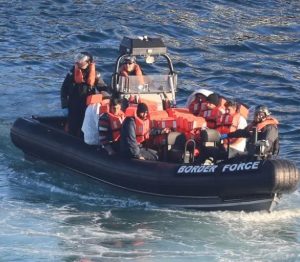UK boat arrivals continue
Almost 13,000 migrants have crossed the English Channel since the UK announced plans to send asylum seekers to Rwanda to have their applications processed, new data reveals.
Figures from the UK’s Ministry of Defence shows the total number of people who have crossed the English Channel so far this year has passed 18,000 and 12,840 people have made the crossing since the Rwanda deal was announced in April.
The news comes as a new report from the UN and British Red Cross says gaps in Britain’s asylum system mean people seeking safety, including those fleeing modern slavery, may be at risk of exploitation (see Impact story here).
The new milestone was reached just five days after a record 696 people were rescued on August 1.
The figures shows 1,709 people had been brought to Britain by August 7, more than half of the 3,053 people rescued in all of August 2021.
Observers say it is likely crossings will continue into next week, with warm weather and calm winds are to continue in the south east of England.
 Meanwhile, the UN refugee agency UNHCR recently issued a statement saying most people arriving in the UK by small boats across the English Channel should be considered to be refugees.
Meanwhile, the UN refugee agency UNHCR recently issued a statement saying most people arriving in the UK by small boats across the English Channel should be considered to be refugees.
The statement is a direct challenge to UK Home Secretary Priti Patel who has told the UK Parliament that 70 per cent of people making the crossing were “single men who are effectively economic migrants”.
A spokesperson for United Nations High Commissioner for Refugees Filippo Grandi told UK media that people travelling by small boat to the UK should be considered to be asylum seekers or refugees, and not migrants.
The statement came as the UK’s controversial plan to process asylum seekers in Rwanda was halted by the ruling by the European Court of Human Rights and a plan was revealed to electronically tag arriving asylum seekers.
The UNHCR said the UK government’s own data challenged claims that most people travelling to the UK by small boat were economic migrants.
“Based on currently available Home Office data, UNHCR considers that a clear majority of those recently arriving to the United Kingdom by boat are likely to be refugees,” a UNHCR spokesperson said.
“Refugees and asylum seekers are not, and should not be described as, ‘migrants’,” the spokesperson said.
“Access to asylum should never be contingent on mode of arrival or nationality. Equally, the only way to establish whether people are refugees is through a fair and efficient determination of their claims, for which the UK has a clear responsibility.”
Appearing before the House of Lords last November, Ms Patel was questioned about her new policy of deeming the asylum claim of any person who arrives in the UK after passing through a ‘safe’ country as ‘inadmissible’ – meaning their claim will not be considered.
“In the last year, 70 per cent of individuals on small boats are single men who are effectively economic migrants. They are not genuine asylum seekers,” she told the Lords.
A new analysis of the UK government’s latest data by The Guardian newspaper shows that 77 per cent of the men, women and children who come across the Channel in small boats are likely to be refugees and would accordingly be allowed to remain in the UK if their claims were assessed.
That figure, or grant rate, is calculated using recent government data showing boat from the top 20 countries of origin between January 2021 to March 2022, and a separate spreadsheet showing the numbers from each country over the same period who are given refugee status or other forms of protection and the number from each country who are refused.
The Guardian reported that data also showed that 1,094 Afghans arrived by small boat between January and March this year, after the fall of the Taliban last August.












